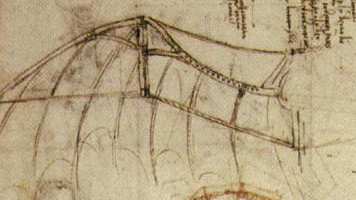Leonardo da Vinci? John H. Secondari? Apocryphal?

Question for Quote Investigator: The famous Renaissance figure Leonardo da Vinci has been given credit for a remark about the experience of flight:
Once you have tasted flight you will walk the earth with your eyes turned skyward.
How could Leonardo know something like this? I am skeptical of this ascription. Would you please explore this topic?
Reply from Quote Investigator: In 1965 an educational film titled “I, Leonardo da Vinci” with a script written by John H. Secondari was created. The audio track included the thoughts and ideas of Leonardo presented as exposition for the viewer. This speculative synthesized material was authored by Secondari based on biographical information about Leonardo’s life. Professor Carlo Pedretti of the University of California, Los Angeles acted as the consultant historian. One scene in the film depicted Leonardo concluding that humans supplemented with bat-like wings would be able to fly:1
I became convinced that man too can fly. I set out to build him wings. For the bird is a living machine as all living bodies are machines, marvelously designed for natural movement. The bird is adapted to the laws of the wind and the air. It moves effortlessly. It soars. It curves. It flows.
Secondari’s fanciful version of Leonardo da Vinci dreams of constructing such wings and encouraging a novice flyer to jump off the edge of a precipice:
At the edge spring unafraid into the void. The current holds you. The earth stretches limitless below you. Be not afraid. Your wings are your salvation even should you plummet; the hurts will be slight, I know.
And once you have tasted flight you will walk the earth with your eyes turned skyward; for there you have been, and there you would return.
Researchers have been unable to find the quotation above in the writings of Leonardo; hence, it probably was constructed by Secondari. The words embodied Secondari’s notion of Leonardo contemplating the wistful thoughts of an imaginary neophyte flyer who had successfully employed the wings he had sketched.
Below are additional selected citations in chronological order.
In 1975 a science fiction story by George R. R. Martin and Lisa Tuttle published in “Analog” magazine included a slightly altered version of the quotation as an epigraph that began with “For” and ended with “you long to return”:2
“For once you have tasted flight you will walk the earth with your eyes turned skyward; for there you have been, and there you long to return.” (Leonardo da Vinci)
In 1977 an article about hang gliding printed in the “Trenton Times” of New Jersey used a version matching the “Analog” text as an epigraph:3
“For once you have tasted flight,
You will walk the earth with your eyes turned skyward;
For there you have been,
And there you long to return.”
–Leonardo da Vinci
In 1979 an article about skydiving in the “Akron Beacon Journal” of Ohio printed an instance:4
“As I was coming down, I thought of some poetry,” said John Winkler, 33. “I think it was Leonardo da Vinci who wrote, ‘For once you have tasted flight you will walk the earth, with eyes turned skyward. For there you’ve been and there you long to return.’“
In 1980 “The Herald Statesman” of Yonkers, New York published an article about a hang glider accident that included an instance matching the “Analog” text.5
In 2003 “Humanities: The Magazine of the National Endowment for the Humanities” printed an altered version that began with “When” contained “will forever walk” and ended with “you will always long to return”:6
When once you have tasted flight, you will forever walk the earth with your eyes turned skyward, for there you have been, and there you will always long to return.
—LEONARDO DA VINCI
In conclusion, current evidence suggests that this quotation was created by John H. Secondari who was attempting to portray the thoughts of Leonardo Da Vinci in an educational film in 1965. The statement was incorrectly reassigned directly to Leonardo by 1975.
Acknowledgement: Great thanks to Scott Hubbard whose inquiry led QI to formulate this question and perform this exploration. Special thanks to the volunteer editors of Wikiquote who discussed this topic on the Wikiquote Talk webpage for Leonardo da Vinci. KHirsch located the statement in the film “I, Leonardo da Vinci”.
Update History: On April 6, 2025 the format of the bibliographical notes was updated.
- 1965 Copyright, Series: The Saga of Western Man, Film Title: I, Leonardo da Vinci, Film Writer: John H. Secondari, Film Producers: John H. Secondari and Helen Jean Rogers, Reel Number: 2, Quotation Timestamp: 16 minutes 20 seconds, Publisher: CRM Films 2215 Faraday Ave, Carlsbad. California. Summary: Explores Leonardo’s intellectual and artistic interests and talents. Depicts the Renaissance period. (Internet Archive archive.org) link ↩︎
- 1975 May, Analog Science Fiction and Science Fact, The Storms of Windhaven by George R. R. Martin and Lisa Tuttle, (Epigraph below the story title), Start Page 12, Quote Page 13, Condé Nast, New York. (Not yet verified; data from Google Book snippet and ISFDB) ↩︎
- 1977 May 24, Trenton Times, Hang gliding by Dick Stanley (Staff Writer), Quote Page B13, Column 4, Trenton, New Jersey. (GenealogyBank) ↩︎
- 1979 July 22, Akron Beacon Journal, Out of the blue: It’s the ultimate sport, say Akron sky divers by Leon Dobbs (Beacon Journal Staff Writer), Quote Page F1, Column 2, Akron, Ohio. (Newspapers_com) ↩︎
- 1980 April 27, The Herald Statesman, Hang glider died ‘with his eyes turned skyward’ by Ed Trapasso (Staff Writer), Section A3, Quote Page 1, Yonkers, New York. (Old Fulton) ↩︎
- 2003 September-October, Humanities: The Magazine of the National Endowment for the Humanities, Volume 24, Number 5, Heroes of the Sky by Janis Johnson, Start Page 8, Quote Page 11, National Endowment for the Humanities, Washington, D.C. (HathiTrust Full View) link ↩︎